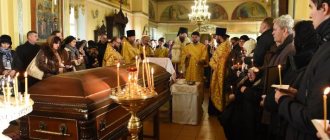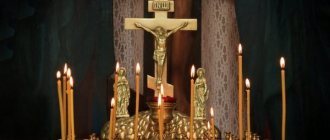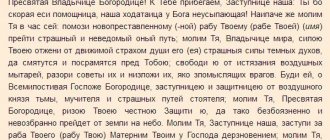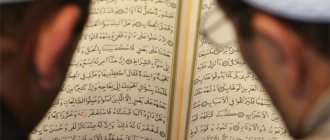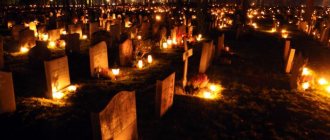The custom of reading the Psalter for the dead dates back to the first centuries of the existence of the Christian Church. However, it is impossible to accurately answer the question of how the tradition began.
For most, the story of the Dormition of the Blessed Virgin Mary is considered an example. According to church tradition, the apostles prayed and sang psalms at the tomb of the Virgin Mary for three days.
Icon of the Dormition of the Blessed Virgin Mary. Russian Empire, XIX - XX centuries. Psalmody singing at the tomb of the Mother of God for three days gave rise to the tradition of performing the Psalter for the departed.
The performance of the Psalter for the departed testifies to a person’s great love for the newly departed and brings him great consolation
Remembering the dead in prayer, we turn to the Lord with a request for forgiveness of their sins, so that, appearing before the court of God, they will be justified.
Prayer for the repose of the newly deceased helps to bring peace of mind to people who have lost loved ones and helps to escape from the bustle of life. Prayer is the strongest and closest connection between relatives (living and deceased).
When you ask the Lord for a loved one, it becomes easier for both the one praying and the one for whom they are praying.
The reading of the Psalter for the deceased, provided that there are several readers, occurs continuously, day and night, standing if possible. Relatives and friends are strongly encouraged to join in prayer at least occasionally.
After all, a prayer text about the deceased is the help that a living person can provide to the deceased.
It happens that reading the Psalter directly over the body of the deceased is difficult for some reason (if the body is in the morgue).
In this case, relatives and friends can divide the kathismas and the time of day, and read the psalms separately, each at home.
The psalms must be pronounced slowly, delving into the meaning of what is being read.
Prayer acquires special power if it is sincere and comes from the heart.
There was also a custom of ordering the reading of the Psalter for the deceased in the monastery. At the same time, it is customary to give alms to those asking, as a sign of intercession for the soul of the newly deceased.
The Psalter is read over the body of the deceased before his burial and after, up to forty days
The Orthodox Church has established the custom of reading the Psalter over the body of the deceased before his burial and after the funeral for up to forty days.
Reading the psalms is a prayer for the soul of the newly departed and calms the hearts of grieving relatives and friends.
The Indestructible Psalter about repose in the Temple (a special kind of prayer that is read around the clock).
The Apostolic Decrees say to read psalms and prayers for the departed on the third, ninth and fortieth day. However, the reading is mainly performed within three or forty days
Both church readers and laypeople are allowed to read the Psalter for the deceased. To do this, a pious Christian must have the skill of reading the Psalter.
It is good when a relative or close friend of the deceased has such a skill, because a prayerful appeal to the Lord by people who know the deceased has great power.
The kathismas are read one after another in order. However, several people are needed for continuous reading. If it is possible to establish a sequence, then the Psalter is read all the time until the funeral service. If not, continue reading as much as possible.
But it is advisable to perform the Psalter for the deceased for up to 40 days, reading at least one kathisma per day.
Kathismas are the sections into which the Psalter is divided. In total, the Holy Book contains 20 kathismas, approximately equal in length, each of which contains a different number of psalms.
What is the Psalter
The Psalter is one of the biblical books of the Old Testament, consisting of one and a half hundred “psalms,” a special kind of songs that capture the experiences and reflections of a pious soul during various life trials. Among the books of Holy Scripture, the book of Psalms occupies a special place. Written long before the incarnation of the Lord Jesus Christ, it is the only book of the Old Testament that was entirely included in the liturgical charter of the Christian Church, since the “Book of Songs of Kings David and Solomon” is considered one of the most expressive and profound collections of texts addressed to God. In later times, the Psalter even began to be considered a book that could make it possible to “reprimand” a person possessed by demons and free his soul.
The order of reading the Psalter for the deceased (for the newly deceased)
The tradition of reading the Psalter after the newly departed is a centuries-old tradition. Over time, a certain order of reading the Holy Book was established.
At the moment of death or immediately after it, the reading of the Psalter at the end of the prayer should begin with “Following the departure of the soul from the body.”
This prayer appeal should alleviate the mental suffering of the dying person. After reading it, relatives begin reading the psalter for the deceased.
Before the first kathisma after the canon “It is worthy to eat,” it is necessary to recite the Canon for the deceased within 40 days.
If the reading of the Psalter is performed at the tomb of the newly deceased, then first the clergyman pronounces “Sequence on the outcome of soul and body.” Then they begin to read the Psalter.
The reading of each kathisma begins with a prayer:
“Come, let us worship our King God...” When reading the kathisma for each “Glory” it is said: “Glory to the Father and the Son and the Holy Spirit, And now and ever and unto ages of ages. Amen Hallelujah, Hallelujah, Hallelujah, Glory to Thee God! Hallelujah, Hallelujah, Hallelujah, Glory to You God! Give rest, O Lord, to the souls of your departed servants:…” (the names of deceased Orthodox Christians are listed in the genitive case).
Then, before reading the next part of the kathisma, we say:
“Lord have mercy, Lord have mercy, Lord have mercy! Glory to the Father, and the Son, and the Holy Spirit! And now, and ever, and unto ages of ages, Amen!”
Next read “Prayer for one who died before 40 days”:
“Remember, O Lord our God, in the faith and hope of the life of Thy eternally departed servant, our brother (name), and as Good and Lover of mankind, forgiving sins and consuming untruths, weaken, forsake and forgive all his voluntary and involuntary sins, deliver him eternal torment and fire of Gehenna,
and grant him the participation and enjoyment of Thy eternal good things prepared for those who love Thee:
Even if you sin, do not depart from You, and undoubtedly in the Father and the Son and the Holy Spirit,
Glorified God Thee in the Trinity, faith, and the Unity in the Trinity and the Trinity in Unity,
Orthodox even until his last breath of confession..."
After reading “Prayer for one who died before 40 days,” psalms are read. At the end of the reading of the Psalter, the reader pronounces the Canon for the one who died (about the deceased), then the reading begins again with the first kathisma.
And again it is repeated in the same order throughout the reading of the Holy Book.
When the entire Holy Book has been read, special prayers follow after the Psalter for the deceased. In the prayer book they are called “after reading the Psalter or several kathismas.”
There are also other rules for reading psalms for the deceased at the tomb. In the Psalter published by the Moscow Patriarchate in 1973, it is recommended that after the first and second “Glory” one should say a “Prayer for every departed Christian”:
After reading the kathismas, the “Troparia are deceased” are read:
“From the spirits of the righteous who have passed away, give rest to the soul of Thy servant, O Savior, preserving it in the blessed life that is with You, O Lover of Mankind. In Thy chamber, O Lord: where all Thy saints rest, give rest also to the soul of Thy servant, for Thou art the only Lover of Mankind.
Glory to the Father and the Son and the Holy Spirit.
You are God, Who descended into hell and loosed the bonds of the bound, May You Himself and the soul of Your servant give rest.
And now and ever and unto ages of ages. Amen.
One Pure and Immaculate Virgin, who gave birth to God without a seed, pray for the salvation of his soul.”
Next, the prayers that are prescribed after reading the kathisma are read.
During Easter week, the reading of the Psalter in Temples stops, but, nevertheless, the clergyman’s handbook says:
“There is no need to delay reading the Psalter over the deceased during Bright Week.” It is enough to add Easter chants after the end of kathisma and “Glory”.
The Psalter about the deceased should be read until the 40th day (or more) at least one kathisma per day.
During the celebration of the Psalter, in contrast to the Liturgy, it is allowed to remember the unbaptized dead (this is discussed with the confessor).
In conclusion, it is worth adding that the Psalter is read (at the feet of the deceased’s coffin), mainly while standing, unless exceptional extremes force him to sit down.
Memorial service
There is a misconception that it is impossible to perform memorial services for the deceased before his funeral service. On the contrary, it is very good, on all days preceding the burial, to order memorial services for the deceased in one or more churches. According to the teachings of the Church, the soul of a person goes through terrible ordeals at a time when his body lies lifeless and dead, and, without a doubt, at this time the soul of the deceased has a great need for the help of the Church. A memorial service helps ease the soul's transition to another life. The beginning of funeral services dates back to the very first times of Christianity. Translated from Greek, the word “requiem” means “all-night singing.” Christians persecuted by Jews and pagans could pray and perform a bloodless sacrifice without interference or anxiety only in the most secluded places and at night. And only at night could they remove and escort the bodies of the holy martyrs to eternal rest. This was done like this: they secretly took the tortured, disfigured body of some sufferer for Christ somewhere to a distant cave or to the most secluded and safe house; here throughout the night they sang psalms over him, then gave him a reverent kiss and buried him in the morning. Subsequently, those who, although they did not suffer for Christ, devoted their entire lives to serving Him, were escorted to eternal rest in the same way. Such all-night psalmody over the deceased was called a memorial service, that is, an all-night vigil. Hence, prayers and psalmody over the deceased or in his memory received the name requiem. The essence of the memorial service is the prayerful remembrance of our departed fathers and brothers, who, although they died faithful to Christ, did not completely renounce the weaknesses of fallen human nature and took their weaknesses and infirmities with them to the grave. When performing a requiem mass, the Holy Church focuses all our attention on how the souls of the departed ascend from the earth to the Judgment of God, how they stand at this Judgment with fear and trembling, confessing their deeds before the Lord, not daring to anticipate from the all-justice Lord the secrets of His judgment on our souls. deceased. The chants of a memorial service not only bring relief to the soul of the deceased, they are also comforting for those praying.
Sorokoust about repose
This type of commemoration of the dead can be ordered at any hour - there are no restrictions on this either. During Great Lent, when the full liturgy is celebrated much less frequently, a number of churches practice commemoration in this way - in the altar, during the entire fast, all the names in the notes are read and, if the liturgy is served, then parts are taken out. You just need to remember that people baptized in the Orthodox faith can participate in these commemorations, just as in the notes submitted to the proskomedia, it is allowed to include the names of only baptized deceased.
Order from the monastery in Jerusalem
At home, you can read the Psalter for the Repose with the blessing of the priest and subject to certain rules
In addition to church reading, there has been a long-standing Orthodox tradition of performing the Psalter at home - privately. Every Christian can read the Holy Book independently at home, without the participation of a priest.
At home, the Psalter is read with the permission of the priest, with a lit candle, observing the rules of reading
Orthodox believers often ask the question: how to read the Psalter for the deceased? How to read correctly.
The reading of the Psalter can be done by agreement - several believers united and read the entire Psalter in a day. If twenty people are reading, then each one pronounces one kathisma.
If there are ten, then two kathismas. If a person reads the Holy Book alone - one kathisma per day.
To read the Holy Book at home, it is recommended to follow certain rules that have evolved over many centuries:
- Before starting to read the Psalter, it is advisable to receive a blessing from the priest;
- at home the Psalter is read with a lit candle or lamp;
- the correct placement of stress is especially important when reading the psalms. A mistake made can lead to a distortion of the meaning of not only one word, but also entire phrases. Before reading the prayer, you should read the interpretation of the psalms;
- reading should be monotonous, quiet, without unnecessary emotions. This helps a person concentrate on prayer, be more attentive, and increases understanding of the text;
- It is not necessary to read the titles of the psalms;
- During the recitation of the psalms, one is allowed to sit. Only during the reading of the Glory, the opening and closing prayers is it necessary to stand;
- During home reading at Glory, psalms are said about health and for the departed;
- There is no need to be embarrassed or discouraged if the meaning of the prayers is not particularly clear. Over time, the meaning of the ancient texts will be revealed and understood.
The order of reading the Psalter for the deceased privately (that is, at home)
Having received permission to read the psalms at home, the believer, trying to comply with all the above rules, can begin to perform the Psalter.
In addition, you need to familiarize yourself with the order of reading the Psalter for the deceased:
- Before you begin to read the Psalter, it is strongly advised to say an opening prayer. Any prayer does not begin with and is read before all other prayers. You can find the opening prayer in any Orthodox prayer book;
- At each “Glory” during home reading, the deceased should be remembered. In this case, the name of the deceased is called with the addition of “newly deceased”;
- after each kathisma, the prescribed troparia and funeral prayer are said;
- After completing the entire Psalter, special prayers should be read, called in the prayer book “after reading the Psalter or several kathismas.” You can find all of them in the Psalter.
In conclusion, it is worth adding that it is necessary to read the Psalter with repentance, humility and gratitude. These essential features of prayer make it alive.
By leaving a comment, you accept the user agreement
Instead of the first prayer book and... primer
We often hear hymns during the Liturgy, at evening services, at memorial services and do not even know that they are actually taken from the Psalter.
In both the Jewish and Christian traditions, love for the psalms was passed down from generation to generation.
According to legend, the apostles sang the hymns of King David over the tomb of the Virgin Mary. Children and adults in Rus' learned to read not from the ABC book, but from the Psalter. The famous saint, Sergius of Radonezh, was very worried as a child because he could not read the psalms evenly, clearly, without errors and hesitations.
Today, children no longer learn to read and write from the Book of the Psalmist David. But over time, as adults, they often come to faith and realize the importance of hymns of praise. By reading and delving deeply into the texts of King David, we accumulate the prayer experience of many generations of Christians.
Such prayer, if it is done with faith, sincerely, with a desire to delve into and understand, is pleasing to God. That is why it is customary to pray according to the Psalter both for the dead and for the living.
